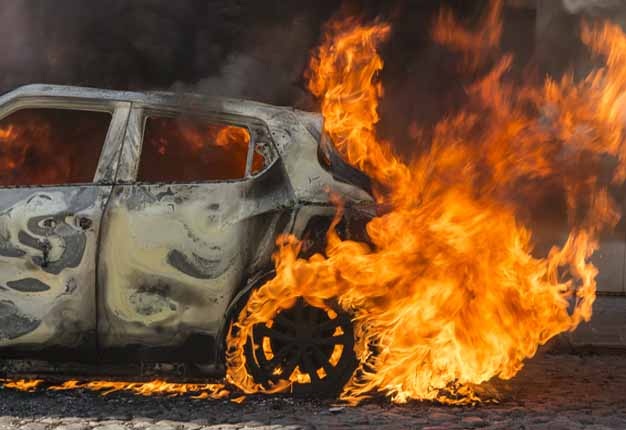
Following several recent incidents where vehicles have burst into flame on impact, Transport Minister Dipuo Peters has said additional research needs to be done to ascertain why vehicles burn on impact.
Motor Industry Workshop Association director, Vishal Premlall, says while this research will offer further insights, vehicle owners need to realise that there are many reasons why a vehicle will burn on impact and regular maintenance is the pro-active way to ensure the risk is reduced.
TELL-TALE SIGN
Premlall said: “One of the first tell-tale signs that you are in danger would be the smell of fuel in the car. This could mean that there is a fuel line loose or fuel pipe leak. However, there may not be a smell of fuel and the vehicle could still be at risk.
"The regular maintenance of your vehicle at a reputable workshop is the best defence against a fire hazard.”
Premlall highly recommends having your car serviced when a service is due.
“Regular servicing may be something you put off until the very last minute but you need to understand that your vehicle, just like any other machine, will succumb to wear and tear."
Especially at this time of year when you may be planning a long road trip, Premlall says you need to ensure that your car has been serviced and any repairs done: “The heat, slippery roads, heavy traffic and driving long distances will all have an effect on your vehicle.”
If you are looking for a workshop, Premlall says it’s important to use an accredited one: “There are over 2400 independent, MIWA-accredited workshops around the country. By using an accredited workshop there is a channel for recourse should you not be satisfied with the job done.
"We need to be responsible to avoid any further tragedies on our roads."
LIKELY CAUSES
According to Arrive Alive, most vehicle fires start in the engine compartment. A motor vehicle contains many flammable materials, including flammable liquids like gasoline and oil as well as solid combustibles such as upholstery. Fuel leaks from ruptured fuel lines also can rapidly ignite.
•Leakage of fuel, motor oil, transmission fluid, power steering fluid, brake fluid, or even coolant can lead to engine fires, and the leakage of a flammable or combustible liquid in an engine compartment results from some kind of failure, says Arrive Alive.
•The failure may be a result of normal wear and tear, failure of a mechanic to make repairs safely, design failure which leads to rupture or abrasion of hoses or manufacturing defects in hoses, gaskets or fluid connections.
•When a new vehicle (or one which has had very recent repairs) burns, failure of the manufacturer (or a mechanic) to safely tighten all fluid connections is the most likely cause.
•Car batteries pose a fairly unique hazard - hydrogen gas evolved in the electrolysis reaction ignites readily in fire conditions and can result in an explosive dispersion of battery acid.
•About 15% of motor vehicle fires originate in the passenger compartment. The main causes of these are electrical short circuits and cigarettes.
Arrive Alive offers the following vehicle fire prevention tips:
•Have your vehicles inspected at least once a year by a trained, professional technician.
•Check for any malfunctioning parts and hanging electrical wirings. Do not leave them hanging.
•Include a check of the fuel system in your regular maintenance schedule. Electrical and fuel system or problems are the major causes of car fires.
•Watch for fluid leaks under vehicles, cracked or blistered hoses, or wiring that is loose, has exposed metal or has cracked insulation.
•Have vehicles inspected and repaired as soon as possible if exhaust or emission control problems are suspected.
•An early indication of a problem is a fuse that blows more than once. The source of the triggered fuse could be either a faulty component or a wiring problem.
•Check for oil leaks and always use a funnel when adding oil. Oil spilled on a hot exhaust manifold can cause a fire.
•If a filling station attendant adds oil, double check that the cap is on securely. This sounds obvious, but better to check than end up with oil all over your engine compartment at best, or an engine fire at worst.
•Clean the vehicle regularly - Do not allow your trash to settle in the vehicle.
•Avoid throwing cigarette butts anywhere
•When driving - Be alert to changes in the way your vehicle sounds when running, or to a visible plume of exhaust coming from the tailpipe. A louder than usual exhaust tone, smoke coming from the tailpipe or a backfiring exhaust could mean problems or damage to the high-temperature exhaust and emission control system on the vehicle.
•Observe your gauge frequently - Check if the temperature is rising.




 Publications
Publications
 Partners
Partners













